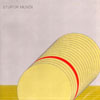 As the ambitious (and essential) reissue program by Die Stadt approaches conclusion, Tietchens' final release for Esplendor Geometrico's label, and last release of the 1980s, gets the expanded treatment. Heavily steeped in rhythmic loops and metallic reverb, it clearly shows the mark of his industrial period, but also of the abstract direction to come.
As the ambitious (and essential) reissue program by Die Stadt approaches conclusion, Tietchens' final release for Esplendor Geometrico's label, and last release of the 1980s, gets the expanded treatment. Heavily steeped in rhythmic loops and metallic reverb, it clearly shows the mark of his industrial period, but also of the abstract direction to come.
Pieces such as "Stimmen der Vernunft" and "Tollerort" exemplify this album:clattering, slightly cut-up rhythmic loops awash in reverb pounding atop one another, becoming more and more dissonant as they move on but never abandoning their underlying rhythmic structure."Aufs Maul" does this perhaps the best:interlocking loops and polyrhyhmic variations add an extra level of complexity and start to take on a Neubauten-like quality, but never sounding like anything but Tietchens.
Others deemphasize the percussion in lieu of rhythmic digital synth loops:"Aufstand der Massen" has the same rhythm usage as others, but focuses more on the disjointed and erratic synthesizer patterns, with the percussive crashes building to dramatic crescendos and then retreating once again."Mammi Money" mixes the two worlds, with a joint rhythm and synth loop that slowly comes apart as if the two pieces are going slowly out of sync before brilliantly becoming completely fragmented.
Amidst these longer tracks are a few shorter, more skeletal ones that lean even more into experimentalism, and the pure sound art Tietchens would soon embrace.The wet, echoy loops of "Pflegkammer Intern" sound as if it could be a field recording within a factory, while "Schacht Hera" loops dense, low-end heavy piano passages in a dramatic fashion.The twinkly synth blips and beeps of "Konvoy" actually recalls his earlier, synth pop Sky Records material, albeit with a darker and more modernized hue.
The four bonus tracks are from the same era, and unsurprisingly sound as if they could have been lifted off of the original album to begin with.Both "Krill-Schatten" and "Heimstatt des Betons" fit the mood, but largely ignore the rhythms in favor of more abstract textures, the latter even sounding more like tape loops of stringed instruments than the synthesized bleakness that preceded it."An Alle" is classic Tietchens of the era and a nod to the earliest industrial music:taut, spring reverberated crashes, taped voices, and a sense of dark ambient menace throughout.
While Asmus Tietchens has since moved into less rhythmic, more abstracted worlds of sound in his more contemporaneous works, I have always had a soft spot for the treated rhythms and looped samples of this era, which often resembles a distillation of the best elements of 1980s industrial.No vocals, no melodies, just heavy, inhuman rhythms and dark dissonance.Like the previous Die Stadt reissues, Stupor Mundi is beautifully presented and remastered perfectly.I have enjoyed every part of this series I have heard thus far, but I may lean more towards this one as a favorite.
samples:
 
Read More

